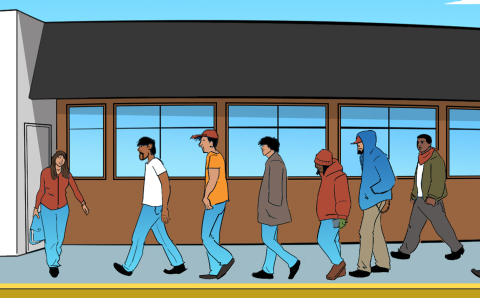Synod 2025 unanimously voted to approve the recommendations of the Assisted Suicide Task Force, mandated by Synod 2023, and commend its report. Another unanimous vote approved “that synod deplore the legalization and practice of medically assisted suicide as well as the efforts to expand it to include minors, and those suffering solely from psychological disabilities.”
Synod is the annual general assembly of the Christian Reformed Church in North America. It is meeting June 13-19 in Ancaster, Ont.
Approving the recommendations of the Assisted Suicide Task Force includes affirming “the value of human life as a gift from God, intrinsic and enduring, recognizing that, as Christians, we are to honor and care for all lives—our own and others—especially in suffering and despair” with a call to pastoral care as a response to suffering, disability, and dying people—including the use of compassionate palliative care.
Synod instructs all “CRC members to make every effort to ensure that meeting spaces and programming are accessible so that our churches are prophetic witnesses that disability, disease, and deformity do not diminish the value and dignity of every human.” It also encourages classes and churches to provide workshops, training, and resources, including those found in the Assisted Suicide Task Force report.
Synod reminds “CRC members to give generously of their time, treasure, and talents to work that supports people who are vulnerable and suffering, and to support the work of civil government to provide compassionate care so that those who are suffering and vulnerable do not feel pressured to end their lives.”
Phil Apoll, Ontario Southwest, expressed his appreciation for the report, saying it was “filled with grace and truth” and dealt with the “biblical and theological” components of life and death well. “I think it’s a beautiful report.”
Martin Spoelstra, Classis Quinte, said, “I just feel the heaviness of the Spirit of God in this moment, and I just want all of you to recognize that we have a moment here to stand before the Lord and make a decision in our churches and our denomination to be clear in this area.”
Hannah den Bak, a young adult representative, said, “I’m extremely appreciative of the compassionate sentiment that I’ve heard” in the discussion. “Mental health is something that as a church we need to take very seriously, and we have the ability to have an incredible impact.”
Stephen Vander Klippe, chair of the Assisted Suicide Task Force and a medical doctor, said, “I don’t believe our response to suffering should be to authorize the health care system to facilitate death; unfortunately, that’s how our society is responding to suffering. I think we need to be involved in compassionate care.” He said, “I do feel like there’s a strong line between intent to relieve suffering and intent to kill.”
When asked about tangible ways people can advocate, David Guretzki, the president of the Evangelical Fellowship of Canada, said the recent election of a new parliament in Canada creates an opportunity to revisit this issue, even as legislation to expand the use of what in Canada is called Medical Assistance in Dying is in process. “Contact your member of parliament to voice your desire to see legislation brought forward, at least (to block the use of MAID) for mental illness.”
Curtis Smit, Classis Yellowstone, drew attention to personal action, as well as political. “I challenge the body to take it to the next step—think of a person in your community that is in this situation and what steps can we personally take to walk alongside that person.”
Al Postma, executive director-Canada for the CRCNA, shared that the Canadian Justice Ministries have some Faith in Action resources that would be helpful for navigating conversations around medical assisted suicide.
Some delegates expressed concern for families facing these situations.
Brian Dijkema, a member of the Assisted Suicide Task Force, said, “For those who have had members of their family go through it, you have to throw yourself at the mercy of Christ. Remember the Lord is gracious and compassionate.”
Stephen Terpstra, president of Synod 2025, said, “It is very rare that synod speaks this strongly about an issue.” He added, “We have spoken in the strongest possible language about the care and the value of human life and the pastoral ways we can live with each other.” In this world of very real suffering, “we long for Jesus’ return,” he said.
As Synod declared the mandate of the Assisted Suicide Task Force fulfilled and dismissed its members with thanks and a loud round of applause. Several people thanked the task force members personally, some weeping.
Synod 2025, the annual general assembly of the Christian Reformed Church in North America, is meeting June 13-19 on the campus of Redeemer University in Ancaster, Ont. Find daily coverage from The Banner at TheBanner.org/synod. Visit crcna.org/synod for the agenda, advisory reports, recordings of plenary sessions, and to subscribe to the daily Synod News email.
About the Author
With a passion for words and creativity, Kristen Parker has been a freelance news correspondent for The Banner since 2019. She became the communications coordinator for Canada with Christian Reformed Church Communications in 2025. Kristen and her husband Chris, enjoy running and thrift shopping. They attend Stratford CRC in Stratford, Ont.









